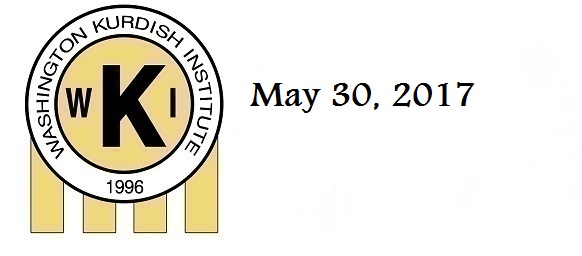1K
Iran
- Six major opposition Kurdish parties denounced the results of Iran’s recent presidential elections. In a press conference, Mustafa Mawlodi, spokesperson for the Democratic Party of Iranian Kurdistan, said voter participation in the Kurdish province was below 60 percent, much lower than what Iranian authorities had previously announced. Prior to the elections, the Kurdish parties boycotted the election and called upon their supporters to do the same.
- During clashes on the Iraq-Iran border (near the Kurdistan region), two Iranian border guards were killed by members of the Free Life Party (PJAK). According to the pro-Iranian regime outlet PressTV, the clashes took place by the borders of Urmia city. PJAK is an armed opposition group which was formed in 2004 by the Kurdistan Worker’s Party (PKK).
- According to several reports by Iranian human rights organizations, a 24-year-old Kurdish man died as a result of extreme torture by Iran’s intelligence servicemen. The Kurdish man, Diako Hashimi, from Kermash province, had left Iran and resettled in Finland in 2011 only to recently return to Iran to visit his father who was ill. Hashimi was detained by Iranian authorities soon after his return to the country. After two months of detention, Hashimi’s parents were told that their son had died and that they must remain silent about his death.
Iraq
- On May 27th, Peshmerga forces repelled an attack by ISIS on their base in Helewa village southwest of Tuz district south of Kirkuk. The ISIS members had planted IEDs on a route that the Peshmerga regularly traveled. The attack resulted in the injury of a Peshmerga commander (Abdullah Bour). The villages of Helewa, located on the main road to Tikrit City, have witnessed insurgencies since 2004.
- Despite several meetings, the various Islamic parties in the Kurdistan region failed to come to an agreement on forming a joint leadership or organizing a united list for upcoming elections. The Islamic Union, the Islamic Movement, and the Islamic Group parties will continue meeting in order to discuss the possibility of future collaboration.
- Iraqi Kurdistan’s High Electoral Commision held a meeting with representatives from the various political parties to discuss election-related issues, such as voter registration and election observation. After the meeting, the head of Iraqi Kurdistan’s High Electoral Commision, Shirwan Zerar, said that no political party had requested any type of preparation for an independence referendum as of yet.
Syria
- Operation “Wrath of Euphrates” forces continue to liberate Raqqa and its surrounding areas from ISIS control. In the past week, the U.S.-backed Syrian Democratic Forces (SDF) liberated Kedyran village, north of al-Hurriyah Dam which has been controlled by ISIS since 2013. After the liberation of Al Tabqa town, outside Raqqa city, the SDF discovered a mass grave of victims executed by ISIS 3 miles east of Tabqa city.
- The People’s Defense Units (YPG) released a statement with statistics on Turkish and Turkish-backed groups attacks on Kurdish areas in Syria. The statement included the dates and times of attacks by Turkey-backed groups on Iska and Birc Sileman villages and Bafusane Hill in Afrin Canton. A pro-Kurdish media outlet released a video showing Turkish helicopters burning acres of wheat in Afrin. Around 2,750 internally displaced peoples (IDPs) from northern Aleppo have reached the Kurdish town of Afrin. The IDPs fled the area because of clashes between armed groups. In Tabqa city, a SDF commander in the city said that about 1,000 youth had registered to join the SDF.
Turkey
- According to Der Spiegel. the German government will extend its negotiations with Turkey over Incirlik base for two more weeks. Turkey has repeatedly denied access to German lawmakers for a visit to Incirlik base in Turkey. Among doubts that an agreement can be reached, German Foreign Minister Sigmar Gabriel will lead the upcoming talks with Turkey. The German government has cited Jordan as an alternative to Turkey for a location from which to base regional operations against ISIS. Separately, the planned visit by several German lawmakers to Turkey was cancelled because of “intense pressure from the Turkish government,” as Claudia Roth stated during a press conference on May 24th.
- After the security details of Turkey’s President Recep Tayyip Erdogan brutally attacked Kurdish protesters, the House Foreign Affairs Committee passed a resolution (HR 354) “condemning the violence against peaceful protesters outside the Turkish Ambassador’s residence” and “calling for the perpetrators to be brought to justice and measures be taken to prevent similar incidents in the future.” The resolution contains 24 main points including that Erdogan’s attackers should be charged and prosecuted for their “unprofessional and brutal manner” under United States law. In regards to the diplomatic steps that can be taken, the resolution calls on the Department of State to “immediately request the waiver of immunity of any Turkish security detail official engaged in assault in the United States States prior to release of that individual from custody.”
- The Turkish army has declared curfews on 59 Kurdish villages in Diyarbakir (Amed) province. The curfew decision came prior to the government launching a military campaign in the Kurdish areas of Lice, Kocakoy, Hazro, and Dijle districts. Meanwhile Besime Konca, a Kurdish lawmaker and member of the People’s Democratic Party (HDP), was jailed again, just after being released from a prior detention on May 3rd. The Turkish authorities also detained several Kurdish students for political activism.

